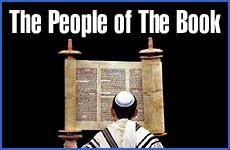 We Were the Lucky Ones
We Were the Lucky Ones


4 min read
Jews have long been known as the "People of the Book." Here's why.
Judaism is in that every single Jew is commanded to know the Torah. The first sentence that a Jewish child is taught is Torah tziva lanu Moshe, morasha kehilat Yaakov ― "Torah was commanded to us through Moses and it is the inheritance of every Jew."
Torah was meant for everybody. It is not the exclusive domain of some priestly class. Rather, it is a living, breathing document ― the lifeblood of our Jewish nation. We are required at all times to involve ourselves personally in its study and practice.
As Maimonides writes (Mishneh Torah, Laws of Torah Study 1:8-9):
Every Jew is obligated to study Torah, whether he is poor or rich, healthy or ill, young or old. Even if he is a pauper who derives his livelihood from charity, or if he has family obligations to his wife and children, he must still establish fixed times for Torah study ― both day and night, as it says (Joshua 1:8), "You shall think about it day and night
The great Sages of Israel included wood choppers, water drawers and blind men. Despite these [difficulties], they were occupied with Torah study day and night, and were amongst those who transmitted Torah in the unbroken chain dating back to Moses
It is interesting to note that the Vatican, by contrast, had an index of prohibited books until not too many years ago. The number one book on that index was the Bible ― the Five Books of Moses. They said it was dangerous to the faith and hence prohibited to study.
Some people are hesitant to learn Torah because they can’t imagine ever becoming a scholar ― so therefore why even get started? But that is faulty thinking. Every drop of Torah study is precious and eternal.
The story is told of Rabbi Yosef Kahaneman, who lived in the Lithuanian town of Ponevich. In the 1930s, when the Nazi threat grew grim, Rabbi Kahaneman escaped and made his way to Palestine. Upon arriving on the shores of Tel Aviv, he proudly proclaimed: "I have come here to establish a yeshiva."
Those who had come to greet the rabbi were perplexed: "Apparently you are not aware," they told him, "that Rommel's troops are now stationed in Egypt, and planning a total invasion of Israel. The Jewish Agency is destroying its records; the rabbis are distributing thousands of burial shrouds throughout the country. Our annihilation is imminent!"
"That will not deter me," replied Rabbi Kahaneman. "Even if I am able to spread Torah learning for only a few days, that in itself would be of eternal significance."
Rabbi Kahaneman built the yeshiva in Bnei Brak, and named it after his Lithuanian town of "Ponevich." Today it is the largest Yeshiva in Israel with thousands of students.
Some people use the excuse, "I’m too old to begin learning." But Rebbe Akiva ― who became the greatest sage of his generation with 24,000 students ― didn’t even learn the Aleph-Bet until he was 40 years old!
On Shavuot, we stay up all night learning Torah, to declare that when it comes to Torah study, there is no time like the present.
As Maimonides writes (Mishneh Torah, Laws of Torah Study 3:7):
Perhaps one will say: "[I will interrupt my studies] until after I make money, and then I will return and study. [I will interrupt my studies] until after I buy what I need and can focus less on my business. Then I will return and study."
If you think like this, you will never merit the Crown of Torah. Rather, make your work provisional and your Torah study permanent. Do not say: "When I have free time, I will study," for perhaps you will never have free time.
Shavuot is the time to make a personal commitment to study Torah regularly. The options are endless. You could:
The most important thing? At least study a little bit, each day.
